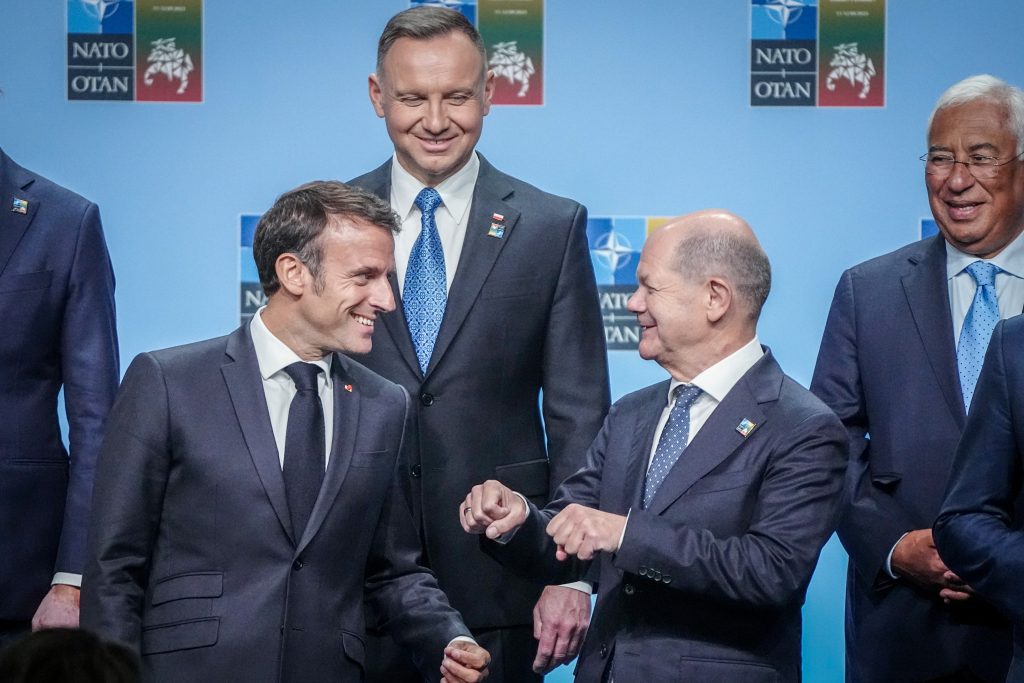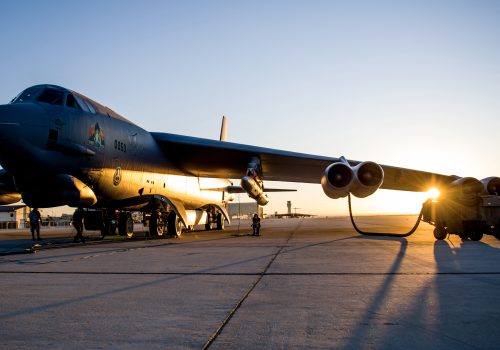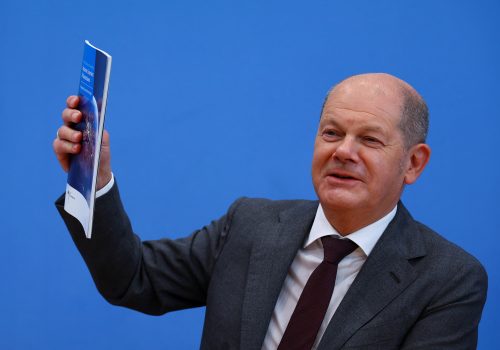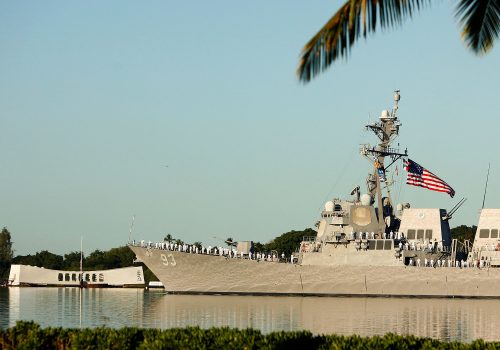Sixteen months after Russia’s illegal invasion of Ukraine, Europe, and Germany in particular, have changed profoundly. Now as NATO leaders meet in Vilnius, it is vital for the Alliance’s European members led by Berlin to build on the transformation in their approach to security that they have been forced to adopt because of the war.
The war in Ukraine exposed bluntly once more the appalling state of European defense capabilities—as seen in former Yugoslav republics in the late 1990s—and how Europe still depends on the United States to fight a war on its own continent.
Under US President Joe Biden, Washington has demonstrated its indispensability to NATO and European security at the very moment of the Russian invasion of Ukraine. But the present situation is unsustainable.
To stay safe against Russian and other aggression in the future, Europe will need a convincing conventional and nuclear deterrent of its own, and Germany will be key. The invasion of February 24, 2022 opened many eyes, but the biggest awakening took place in Germany.
Moscow’s assault on a European neighbor caused an epiphany in Berlin’s decades-long, complacent foreign and energy policy, as well as in its free-riding security and defense posture under Washington’s nuclear and NATO’s conventional umbrella. Chancellor Olaf Scholz understood the urgency for his country as he declared in his famous speech a Zeitenwende (time for change) for Germany’s foreign, security, defense, and energy policy, which was well received in Europe and the United States. Scholz pledged a one hundred billion euro special fund to rebuild the German armed forces that had decayed under the sixteen-year-long chancellorship of his predecessor, Angela Merkel. Berlin’s selfish post-1989 mantra—essentially “make peace without spending money for weapons”—became history almost overnight.
Today Germany is one of Ukraine’s biggest weapons providers after the United States. It is about to increase its defense budget of fifty-one billion euros to fifty-three billion euros. But Berlin needs to understand that the moment of truth has arrived for the Euro-Atlantic community of democracies.
After the US presidential election next year—no matter who makes it into the White House—Europe will need its own capabilities to defend European territory and borders from an outside aggressor. If Donald Trump returns to the White House or another Republican president takes office, we could see a shrinking of defense support for NATO, as the US military may concentrate its forces toward Asia and the Indo-Pacific.
Former US Secretary of Defense Jim Mattis admitted during his confirmation hearing in 2017 that the US military is not strong enough to meet the challenges it faces around the globe. Or in the words of Elbridge A. Colby, former deputy assistant secretary of defense, “if we have to leave Europe exposed, so be it… Asia is more important than Europe.”
Therefore, to make Europe safe for peace and democracy in the future, NATO needs to strengthen its conventional and nuclear pillars. Russia’s aggression today against Ukraine and tomorrow perhaps against Poland or the Baltic states makes the Europeanization of NATO imperative. In the words of former US Secretary of State Henry Kissinger: “Europe has to play a special role in American thinking… But I could understand in a modified arrangement that Europe could play a more important role in some areas. I am not offended by autonomy in my definition of it.”
For the past twenty years, US presidents from both the Democratic and Republican parties have been asking European allies to take burden-sharing seriously. Here are four ways to start:
- It is imperative to strengthen the competitiveness and innovativeness of Europe’s military technological and industrial complex and to harmonize its procurement base. Buying off-the-shelf US equipment can go hand-in-hand with buying European equipment—and this should apply to all NATO members.
- Not only must NATO forces be interoperable—allowing them to use each other’s platforms seamlessly while fighting alongside each other—but this should extend to potential future NATO members like Ukraine, Moldova, and Georgia.
- For the United Kingdom, France, and Germany, a permanent increase of their defense spending to beyond the NATO target of 2 percent of gross domestic product should be seen as an obligation. Emerging from the Vilnius summit, where a new push is under way to get all allies beyond 2 percent, it is the responsibility of the biggest European economies to upgrade their conventional forces in order to protect European soil—when Washington might be too busy in Asia.
- Europe needs a credible nuclear deterrent of its own, under NATO command. Only a trilateral British, French, and German nuclear umbrella, combined with a US umbrella, all under the command and control of the Supreme Allied Commander Europe (SACEUR) will be a credible deterrent for Russia. This would require that France and Germany find a solution for equipping their joint Future Combat Air System—a new generation of advanced fighter jets—and the German F-35 dual capable aircraft with French nuclear weapons. Germany would not have its own nuclear weapons, so this arrangement would not violate the Nuclear Non-Proliferation Treaty. The NATO command structure must be tailored in such a way that Europe can fight a conflict in which neither Americans nor Canadians may wish to get involved, while taking advantage of NATO commands and systems. To this end the deputy SACEUR has to be European, and a headquarters-based Combined Joint Task Force must serve as his or her operational command.
Today it is clear that the main threat to European security does not come from Russia’s conventional forces, but from its tactical nuclear weapons and its sophisticated hybrid warfare. For Germany to be a full and equally strong part of a new European pillar of NATO, it needs to break the ultimate taboo and accept that a wider shared European nuclear deterrence should now be part of Berlin’s Zeitenwende defense thinking.
Of course, an outcry will arise: A stronger nuclear role for Germany will sound unthinkable to many. But so was Russia’s full-scale invasion and war in Europe only last year.
There have been strategic debates in Bonn since the 1950s about whether the Article 5 joint defense pact would really be implemented by Washington in case of an attack—whether a US president would sacrifice New York for Berlin or New Orleans for Munich. Today 62 percent of Germans are in favor of spending more money to modernize the Bundeswehr properly so that it can defend its country. Meanwhile, 47 percent of Germans agree with their government’s heavy support of the Ukrainian military—with another 16 percent wanting it to go further.
This, then, is the moment to start a debate in Berlin, Paris, and London about a trilateral French, British, and German nuclear European Defense Initiative, and the responsibility of those three powers to protect Europe if Article 5 is invoked in a worst-case-scenario.
Adm. Jacques Lanxade was joint chief of staff of the French Armed Forces and served as a defense advisor to French President Francois Mitterrand.
Denis MacShane is a former UK minister of Europe and a former UK delegate to the Parliamentary Assembly of NATO.
Margarita Mathiopoulos is a defense expert and professor emerita of US foreign policy and international security at Potsdam University. She also served as a foreign policy advisor to the former chairman of the German Free Democratic Party, Guido Westerwelle.
Gen. Klaus Naumann served as chairman of the military committee of NATO and joint chief of staff of the German Armed Forces.
A German language version of this article first appeared in Handelsblatt. It is printed here with the authors’ and publisher’s permission.
Further reading
Wed, Jun 14, 2023
Before embarking on arms control talks, Biden needs a nuclear deal with Congress
New Atlanticist By Robert Soofer
The White House and Congress disagree over the type and number of nuclear weapons needed to deter Russia, China, North Korea, and potentially Iran.
Wed, Jun 14, 2023
The hits and misses in Germany’s new national security strategy
New Atlanticist By
Chancellor Olaf Scholz has just released Germany's national security strategy. Atlantic Council experts answer the most urgent questions about the document and the path forward for this major European power.
Fri, Jan 13, 2023
No ‘pivot’ needed: The US can secure Europe and Asia at the same time
New Atlanticist By Andrew A. Michta
The argument for a “pivot to Asia” at the expense of the European pillar of American grand strategy reflects a fundamental misreading of US history and interests.
Image: Emmanuel Macron (l-r), President of France, Andrzej Duda, President of Poland, German Chancellor Olaf Scholz (SPD) and António Costa, Prime Minister of Portugal, stand together for the family photo. (Kay Nietfeld/dpa via Reuters Connect)



